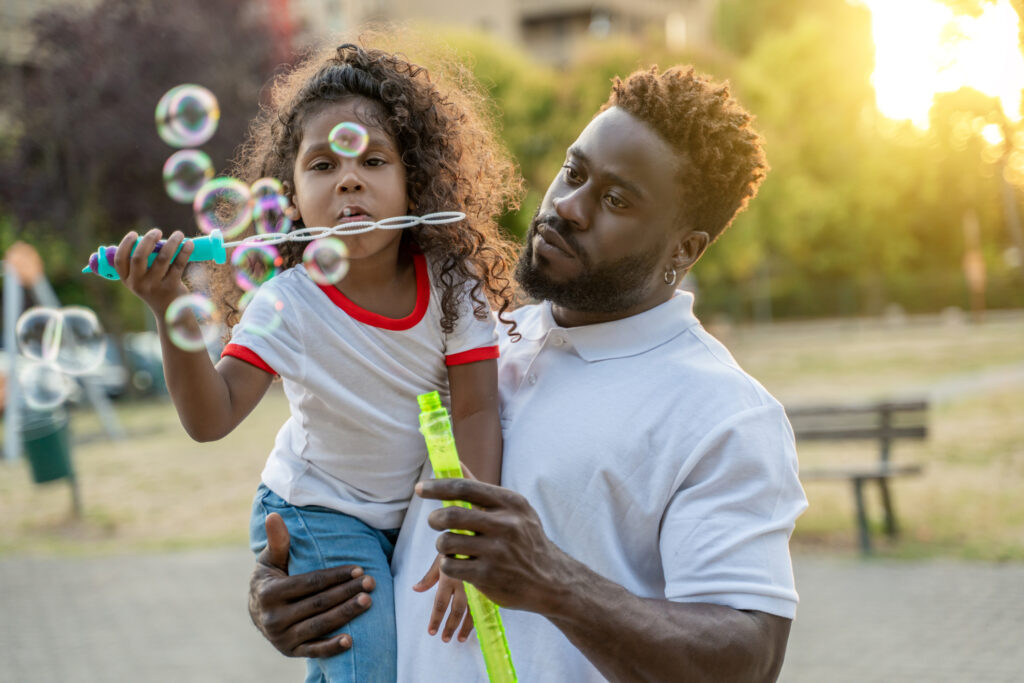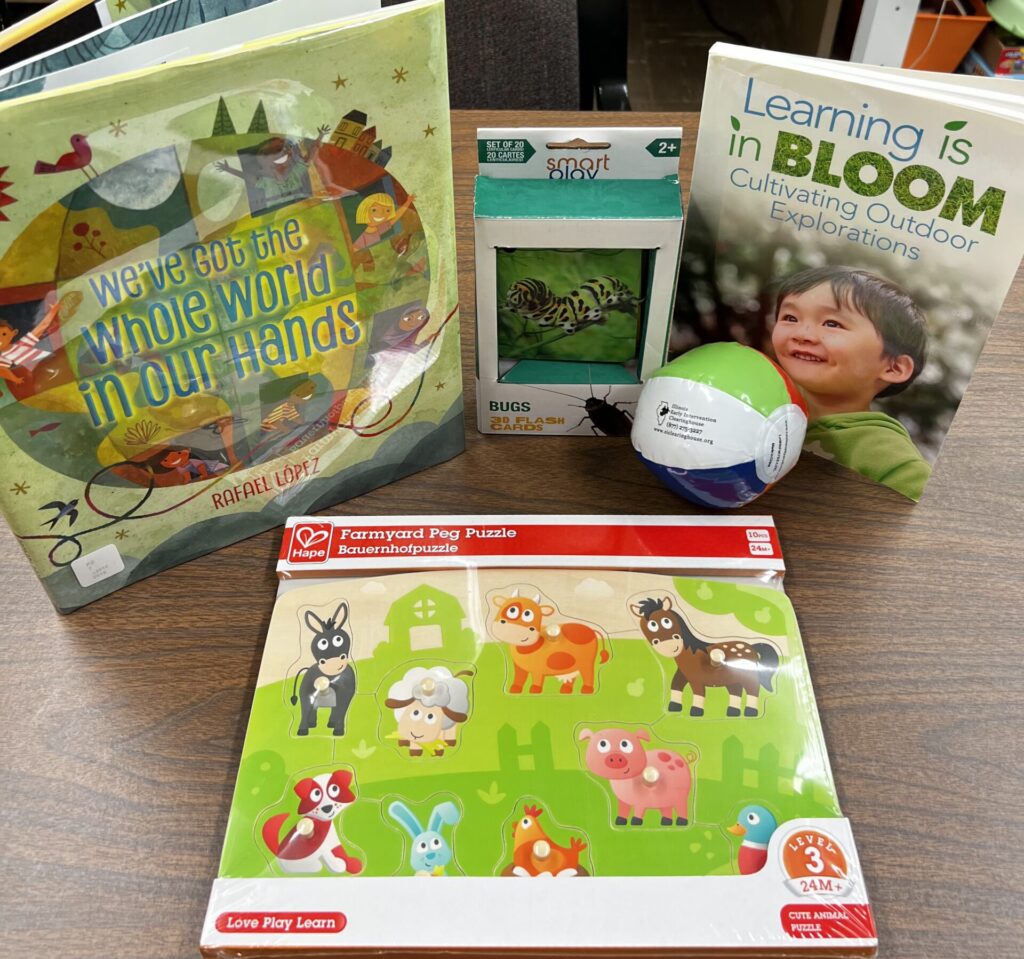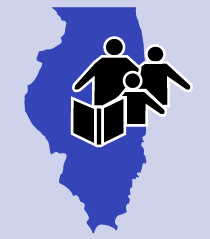Outdoor play can be great for working on early intervention outcomes.
“Some old-fashioned things like fresh air and sunshine are hard to beat.”
– Laura Ingalls Wilder, author
Video Spotlight: Outdoor Fun
Build Skills When Exploring Outdoors

Warm weather means it is a great time to explore the outdoors. Outside play is a wonderful opportunity to work on early intervention (EI) outcomes. Talk with your EI team about strategies and activities that may be especially useful for your family as you work on your EI outcomes. As you talk, you can brainstorm how everyday activities can become opportunities to practice new skills.
For example, consider the fun warm weather pastime of blowing bubbles. Infants and toddlers love to see bubbles magically fly from a bubble wand. Did you know that when you are blowing bubbles you are working on many skills, including:
- Oral motor skills: Blowing bubbles develops the small muscles in your child’s mouth as they pucker their lips and blow bubbles. Strengthening these muscles is important for developing their ability to form clear sounds when speaking and to eat and swallow safely.
- Gross motor skills: Your child can reach to pop bubbles and build hand-eye coordination as they reach. Walking toddlers and infants may follow the bubbles on their feet and practice their moving skills.
- Eye tracking skills: Younger infants and toddlers learn to follow the bubbles with their eyes.
- Vocabulary and concept development: As you talk to your child about bubbles, you expose them to words such as clear, soapy, float, and pop.
- Cognitive development: When young children touch a bubble, it pops, giving them a chance to explore cognitive concepts such as cause and effect.
- Joint attention: Smiling and laughing together builds strong relationships and helps children learn to connect with others and discover shared interests. Who can help but smile as bubbles float by?
Through planning and teamwork with your EI team, you can be ready for a full summer of fun and learning! For more ideas for summertime play that can help improve early intervention outcomes, read the full article.
Need an iPad or a Hotspot for Live Video Visits?

Many families are receiving Early Intervention services through live video visits. To help families with technology needs, the Early Intervention Clearinghouse has added several technology devices to the lending library:
- iPads with a cellular data plan (device and Internet access)
- iPads without a cellular data plan (device)
- Hotspot with cellular data plan (Internet access)
To request a device, please complete our Device Loan Request Form (also available in Spanish). For more information about live video visits, see our tip sheet Introduction to Early Intervention (EI) Live Video Visits: Frequently Asked Questions (also available in Spanish).
Planning for Fun

The summer can be a fun and challenging time. It can be liberating to not have school or daily routines. Without formal scheduling guidelines, you can choose your preferred activities. However, it can also be difficult to identify such activities, especially without guidance or suggestions. Below, we list some suggestions for summer activities.
Capitalize on Your Child’s Strengths and Preferences
As a parent, you know your child best. Think about your child’s favorite activities, places, and people. Try to identify summer activities that align with your child’s strengths and preferences. For example, if your child loves water play, consider visiting a local children’s museum that has water activities, going to the local pool, and organizing water activities in your back yard.
For additional suggestions on summer activities, read the full article.
Enter our Giveaway!
Enter to win!
Spending time together while reading aloud helps to create strong parent-child bonds and promotes healthy brain development. Complete the entry form below for a chance to win a read-aloud prize package!
All entries received by 8/31/2023 will receive a gift in the mail.
The winner can choose the preferred language for books.

Set Me Up For Success
Families reach EI outcomes by making the most of everyday moments. In early intervention (EI), we focus on how children learn during everyday routines. Caregivers can help children successfully participate by encouraging infants and toddlers to be active participants throughout the day. As a caregiver, you can:
Take Turns With Your Child
- You do, I do! Wet a washcloth and let your child take a turn wiping his own face.
- Wait for a response and help your child learn the routine. For example, say “so big” and wait for your child to hold up her arms over her head or help her hold up her arms.
- Take turns stacking blocks or throwing bean bags or rolled-up socks into a basket.
Match and Follow Your Child
- Notice where your child is looking or turn your head toward the sound your child is reacting to.
- Respond to your child’s feelings by naming emotions such as sad, happy, and mad.
- Copy your child’s action or sound. Wave your hand back at her wave or clap along with your child.
Recommended Books and Resources
Important Updates
The State Systemic Improvement Plan (SSIP) Update

We’ve started our scale up efforts! We have now expanded our work to five new Child and Family Connections offices. Scale up work began with a webinar to introduce the work. We then held recruitment webinars, collected some information from team members, and hosted kickoff events for each new site. In May, the Leadership Teams received their initial child outcomes training. This initial capacity-building activity enhanced their ability to support their local area and provided an opportunity for identifying system strengths and challenges. Each new team will also meet in June to further the planning for their local area.
The original sites continue their efforts around family engagement. We are also involved in technical assistance with federal partners to examine the accuracy of our child outcomes data.
If you have any comments or questions about the SSIP, please email Chelsea Guillen at cguillen@illinois.edu.
Upcoming Events
Early Intervention Town Halls (Virtual)
The Director of the Bureau of Early Intervention is hosting two more virtual town halls with families of children in early intervention. During this time, you can share your experiences, ask questions, and voice your suggestions to improve early intervention.
Upcoming Meeting Dates:
Thursday, November 9, 2023
Spanish – 6:30-7:30 pm
English – 7:30 – 8:30 pm
Register online for the town hall meeting or contact Alejandra Griffet, by email: agriffet@illinois.edu or by phone: 217-333-5841
Family Outcomes Survey
Improving outcomes for children and families is a priority of the Illinois Early Intervention Program. Every year we strive to learn just how effective early intervention has been in helping families achieve outcomes by sending out a “Family Outcomes Survey (FOS)” to each family exiting the Early Intervention Program. The survey results help us understand the changes you experienced as a result of the early intervention services and support your family received.
Early intervention is intended to help both children and families. The Family Outcomes Survey questions focus on you understanding your child’s strengths, abilities, needs, and your ability to help your child develop and learn.
Family feedback helps us evaluate our program for future improvements and can also help your local CFC understand how families are benefitting from their work. All families exiting the EI system will receive an invitation to complete the FOS via text message rather than a paper survey via mail. When you receive the Family Outcome Survey, please answer the questions and send it back as soon as possible.
We greatly appreciate your input, as it is invaluable! Thank you in advance!


